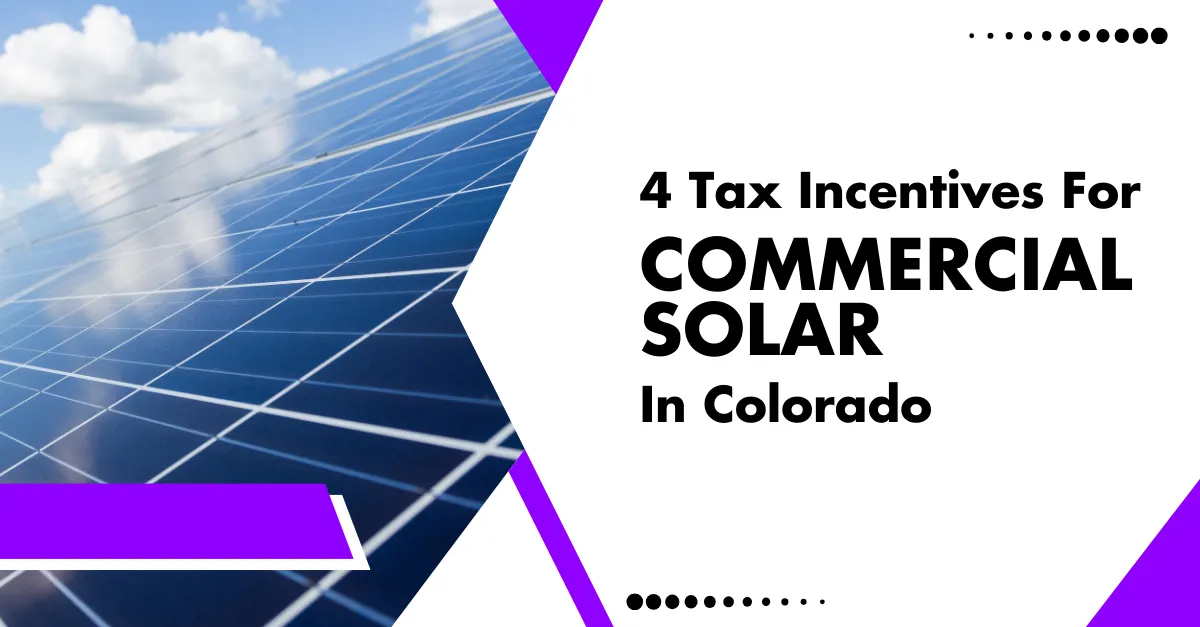4 Tax Incentives for Commercial Solar in Colorado

4 Tax Incentives for Commercial Solar in Colorado
Are you thinking about adding solar panels to your business in 2024 or beyond? There are several tax incentives for commercial solar in Colorado.
Going green isn’t just good for the planet – it could very well be a goldmine for your business, too.
If you own a business in Colorado, the perks of going solar go beyond cutting down your energy bill. We’re talking about tax incentives that can save you some serious cash.
If you’re curious about the “sunny side” of solar tax incentives in Colorado, this post is for you.
What is a Commercial Solar Incentive?
Before we get too far into the weeds, let’s clarify what we’re talking about. A commercial solar incentive is a financial benefit provided to businesses that install solar panels on or adjacent to their buildings (somewhere on property).
These incentives can come in various forms such as tax credits, rebates, or grants, aimed at reducing the initial cost and encouraging renewable energy adoption.
4 Tax Incentives for Businesses Going Solar in Colorado
Colorado has always been a trailblazer when it comes to promoting renewable energy. True to form, they’ve rolled out the red carpet for businesses who are looking to go solar. From federal tax credits to state-specific incentives, there are plenty of ways to save.
Here’s a rundown of some of the most enticing options:
1. Federal Solar Investment Tax Credit (ITC)
One of the most compelling incentives for businesses is the Federal Solar Investment Tax Credit. A nationwide incentive, it’s a credit that allows home and business owners to claim a percentage of the cost of installing a solar energy system from your federal taxes.
For systems installed between 2022 and 2032, the ITC allows for a 30% tax credit. If you meet specific labor standards, known as Prevailing Wage and Apprenticeship (PWA) requirements, this number can increase even further.
Any business that purchases a solar energy system for their property can claim the ITC, including LLCs, S-Corporations, and nonprofits. However, the system must be new and operational by December 31st of the tax year you’re claiming it. The credit can also be carried forward if your tax liability isn’t high enough to claim the full amount in one year.
Pros:
- Significant reduction in federal tax liability.
- Encourages investment in renewable energy.
Cons:
- Requires upfront capital investment.
- Dependent on meeting specific labor standards for higher credits.
2. Colorado Energy Performance for Buildings Act
The Colorado Energy Performance for Buildings Act aims to reduce greenhouse gas emissions by improving energy efficiency in buildings.
Under this act, building owners (of buildings larger than 50,000 square feet) are required to benchmark their energy usage and report it annually. Compliance can lead to energy performance improvements and make your business eligible for additional rebates and incentives, enhancing the benefits of installing solar panels even more.
Pros:
- Encourages energy efficiency and sustainability.
- Establishes statewide standards for upgrading buildings and reporting data.
Cons:
- Requires regular energy usage benchmarking and reporting.
- May necessitate initial investments in energy efficiency improvements.
3. Federal Production Tax Credit
For businesses generating electricity from their solar installations, the Federal Production Tax Credit (PTC) offers a per-kilowatt-hour (kWh) tax credit. For facilities placed in service after December 31, 2022, the credit is 2.75 cents per kWh for the first 10 years of operation.
Pros:
- Provides ongoing financial benefits for 10 years.
- Encourages sustained investment in solar energy.
Cons:
- Requires significant initial investment in infrastructure.
- Ongoing maintenance required to keep the system operational.
4. Colorado Sales and Use Tax Exemption for Renewable Energy Equipment
If you’re thinking about buying something like heat pumps or lithium-ion batteries, this is the initiative to pay attention to.
It exempts the state’s 2.9% sales and use tax for renewable energy systems, so you won’t have to pay tax on any renewable purchase (including solar panels and other technologies).
Pros:
- Offers a significant incentive to business owners interested in purchasing solar equipment outright.
- Allows for the purchase of other technologies and equipment.
Cons:
- May exclude leased or financed equipment.
5. Local Government Incentives
Although Colorado doesn’t have much at the state level – besides what was mentioned above – to encourage business owners to invest in green energy, the good news is that several towns, counties, and municipalities have begun to offer property tax rebates and sales tax credits for businesses installing solar energy systems.
You’ll want to check with your local governing body for more information on this, but it could be a good option for you to look into.
An example is the incentive offered by Holy Cross Energy, which operates out of Glenwood Springs, Avon, and the surrounding areas. It offers incentives for business owners who “install renewable energy generators up to 25 KW to net their power generation against the electric consumption at the same meter.”
If you’re not sure where to start your search, Energy Smart Colorado is a great place to check. Here, you’ll find details about Energy Smart members in various Colorado communities, as well as participating utility partners.
Pros:
- Additional financial support.
- Encourages local investment in renewable energy.
Cons:
- Varies widely by location.
- May require additional approval processes.
Other Benefits of Going Solar
Aside from the tax incentives, there are a few other reasons to consider adding solar to your business. Dollars and cents aside, here are three compelling motivators:
- Reduced Operating Costs: One of the most immediate benefits of installing solar panels is the reduction in your electricity bills. By generating your own power, you’ll rely less on the grid, leading to significant savings.
- Energy Independence: With solar panels, your business becomes less dependent on external energy sources. This is particularly advantageous during peak demand times when electricity prices are highest.
- Corporate Social Responsibility: Going solar is a fantastic way to showcase your commitment to sustainability. It can boost your brand image and attract environmentally-conscious customers and investors. If you’re looking for good PR, this is it.
Another question business owners have regarding the benefits of solar in Colorado is whether they can net meter. In a nutshell, net metering is a method of billing that credits solar energy system owners for the electricity they contribute back to the grid.
In Colorado, several utility companies, including Xcel Energy and Black Hills Energy, offer net metering programs. This means your business can earn credits for excess energy produced, which can be used to offset future electricity bills.
To qualify for net metering, make sure your solar system has a smart inverter with IEEE 1547 and UL 1741 certifications. Professional installation is also recommended to meet these interconnection requirements, as DIY systems may not qualify.
The Takeaway
Going solar in Colorado isn’t just a bright idea for helping the planet – it’s also a financially savvy move that comes with a heap of benefits.
From hefty federal tax credits to state-specific incentives and the ability to net meter, the opportunities for savings are vast. Plus, the environmental and brand reputation benefits make it a win-win.
If you’re ready to explore how solar can transform your business, there’s no better time than now. Tap into these incredible tax incentives and start your solar journey with confidence.
And remember, if you need expert advice or help with the installation, IE Construction is here to guide you every step of the way. Get in touch today and shine a light on a greener future for your business!




